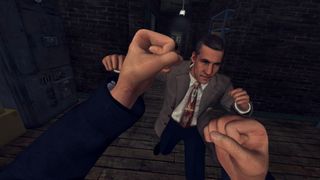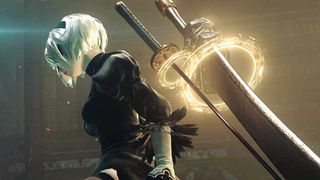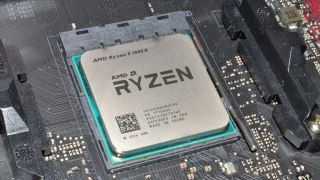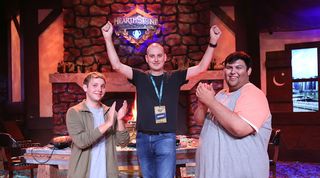Chris Livingston: VR isn't dead

This is a weird one for me, because among the PC Gamer staff I've perhaps been the most skeptical of VR (possibly because I lived through the first round of VR pie-in-the-sky promises in the 1980s). And by no means have I changed my views on it: it's simply not cheap or convenient enough to become a part of mainstream gaming. And won't, I think, for another decade. Still, I think (and have always thought) the technology is neat if impractical, and I was a bit worried that after it failed to truly catch on for the PC, it might simply wither and die.
So it's been great to see that some developers and publishers are still embracing it. Bethesda went all in this year, releasing a special episode of Doom plus the entirety of Fallout 4 in VR. Both games have their issues, but they're also both extremely enjoyable through a headset. Rockstar released a truncated version of LA Noire in VR, Croteam brought us Serious Sam VR, and there were some smaller games like Rick and Morty: Virtual Rick-ality that use the technology astoundingly well. Gamers are still interested, too: a Kickstarter for an 8K VR headset asked for $200,000 and received over $4 million.
VR isn't dead, and that's good. There's a long road ahead, major advances in the tech needed, and way more games required. It just needs more time, and the more developers (especially big ones) that keep their hats in the ring, the more time it'll have.
Wes Fenlon: Japanese games had a hell of a year

Japanese game companies have been struggling for years, having to spend more and more money to developer big games that bring in less and less cash as their players switch over to mobile. For a long time, this was only a woe for console players—we barely got Japanese games on PC at all! But holy hell, has 2017 been a great year for Japanese games everywhere. Off the PC, the Nintendo Switch has been a phenomenal success, and it's a joy to play games on. Zelda: Breath of the Wild is one of the best games I've ever played. Yazuka 0 was the talk of the town for months, earlier this year. Persona 5 is the most stylish RPG in ages. Nioh revitalized Team Ninja.
And on PC, the story has been just as great. Nier: Automata proved to be a smash hit beyond all expectations, and it's still being talked about constantly after being out for nine months. Sega and Platinum games brought Bayonetta and Vanquish to PC after years of fans pining, and both look and play as smoothly on PC as they deserve—easily the definitive versions of those games. Resident Evil 7 made the series scary again, something it desperately needed. With every success, it feels like Japanese developers and emboldened to plan PC builds of their games right from the start.
The highlight of my year was tapping into the excitement around Japanese games with an entire week of features devoted to them. The ones I'm most proud of are How Japan learned to love PC gaming again, which tries to capture the how and why of PC gaming finally sticking for Japanese developers, and Phantasy Star Online will never die, a feature about the incredibly welcoming fan communities still playing PSO to this day. I had both of these stories in my head for years, and publishing them was true catharsis. It's hard to imagine Japanese developers topping their 2017 output anytime soon, but that's okay. 2017 was a year of resurgence and renewed confidence, and I think everyone's excited about what comes next.
Jarred Walton: Ryzen shout, the CPUs are out

This year has been insane on the CPU front, and while we didn't award AMD's Ryzen our Best CPU of the Year, it's chiefly thanks to AMD that Intel has pulled out the stops and actually released some compelling upgrades. Starting with the Ryzen 7 parts, and then moving through Ryzen 5, Ryzen 3, and finally Ryzen Threadripper, AMD has become a viable competitor in the CPU realm once more.
The biggest gaming news, reviews and hardware deals
Keep up to date with the most important stories and the best deals, as picked by the PC Gamer team.
My hopes for Ryzen were perhaps too high, but Ryzen 7 is still a very fast processor. The 8-core/16-thread Ryzen 7 models compete well against Intel's i7-5960X, i7-6900K, and i7-7820X, particularly in professional applications. But most games don't utilize lots of cores, so Ryzen somewhat unexpectedly does a bit poorly in games. It comes down to per-core performance, where Intel's architecture is simply better tuned at this stage.
But choice is a good thing, and we should see new Ryzen processors next year that build on this year's successes. Using an updated Zen+ architecture and a 12nm process should allow for higher clockspeeds, and hopefully AMD has refined the core design to improve latencies as well, which would boost gaming performance. There are rumors of new 400-series chipsets, but the new parts should be compatible with existing 300-series AM4 boards. Ryzen was this close to greatness, and the update may actually push AMD over the top.
Tim Clark: Finally winning something

When we moved into our new office our bosses decided to liven up the place with some motivational slogans on the walls. One of these is positioned just behind Evan's head and reads: "Results matter and success feels good". I have had plenty of time to ponder it, it wasn't until my trip to China in the summer that I truly I understood the management inspo. I was there following Muzzy's bid to win the Hearthstone Spring Championship, and though he ended up having a rough tournament, it was fascinating seeing how these young players deal with all the prep and pressure. My feature on that experience is my favourite thing I wrote this year, and China only cemented my love of the tournament scene.
I also got a tiny taste of what it's like to compete. Between the proper matches, Blizzard organised a press tournament to keep us out of trouble. Over the course of multiple 3-2 series victories (two of which I fell 2-0 behind in), and one absolute stomp against a nice Japanese lady who didn't seem to have played the game before. The rush of relief I felt when I won the final—and with a Pyroblast to face, no less—felt better than probably anything I've experienced related to gaming. Plus it meant I got to have my picture take with Ant and (the actual winner) Hoej, both of whom are absolute sweethearts.
Generally speaking I avoid any sort of serious competition, and though this was of course supposed to be a bit of fun, you better believe I took it seriously, even going so far as asking Muzzy for pick and ban advice. So I guess what I'm saying is results do matter, success does feel good. I just needed a children's card game to teach me.
The collective PC Gamer editorial team worked together to write this article. PC Gamer is the global authority on PC games—starting in 1993 with the magazine, and then in 2010 with this website you're currently reading. We have writers across the US, UK and Australia, who you can read about here.
Most Popular


